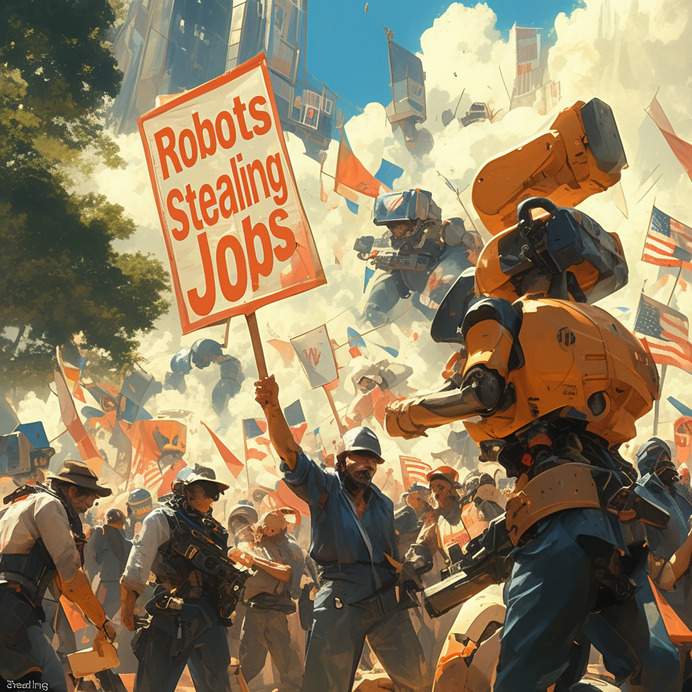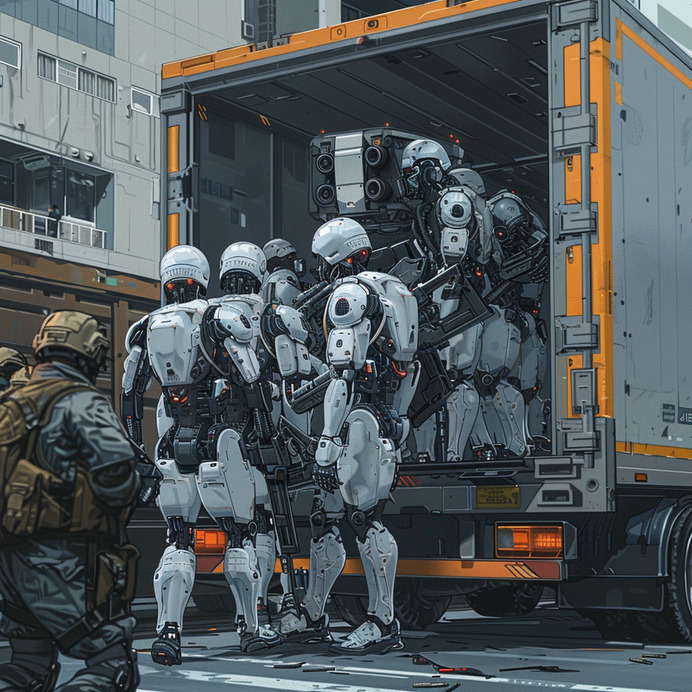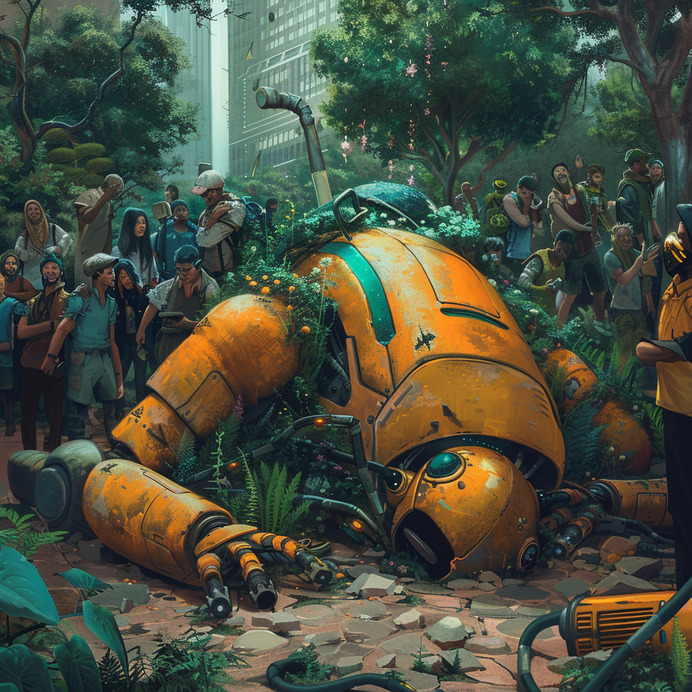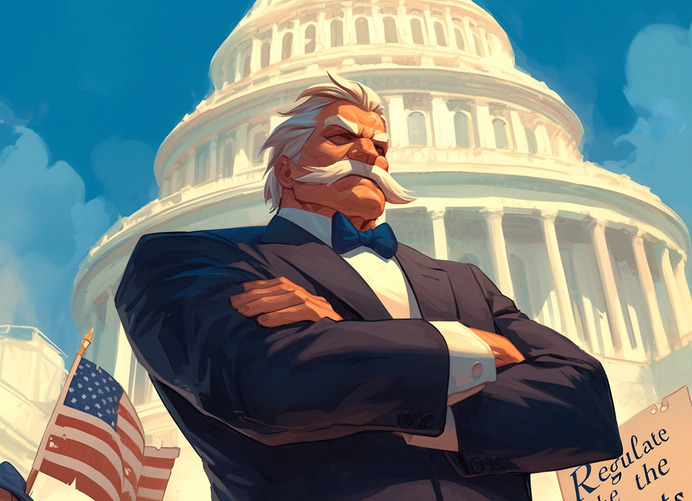Navigating the Crossroads: The Rise of Artificial Intelligence and Government Regulation
It’s the year 2026. Western governments announce the immediate regulation and restriction of the development of- and research into artifical intelligence.
The governments will be threatened by the empowerment of the population by AI and the open source community will be demonised. Open source AI will be called a threat to the security of the state and made illegal. Large companies that develop AI systems will be regulated and anyone wanting to use an AI or LLM will have to get a license and their activities will be monitored.

The Narrative
“Ladies and gentlemen,
I stand before you today with a solemn warning. Our world stands on the brink of a revolution unlike any we have seen before. The rise of artificial intelligence threatens not only our livelihoods but the very fabric of our society and the essence of our humanity.
Make no mistake, AI is not merely a tool for efficiency or convenience. It is a double-edged sword that has the power to upend entire industries, leaving countless hardworking men and women without jobs. The automation wave driven by AI will sweep across sectors, from manufacturing to service industries, leaving a trail of unemployment and despair in its wake.
But the threat of AI goes beyond economic displacement. We must confront the reality that these powerful technologies can and will be exploited by those with malicious intent. Criminal organizations and hostile states will weaponize AI to launch cyberattacks, disrupt critical infrastructure, and sow chaos within our borders. The very security of our nation is at stake.
Yet, perhaps the gravest danger lies in the existential threat AI poses to our humanity and culture. As algorithms replace human judgment and creativity, we risk losing the essence of what makes us human. Our cultural heritage, our traditions, our values—all are at risk of being eroded in the relentless pursuit of technological advancement.
We stand at a crossroads, faced with a choice that will shape the course of history. Will we allow ourselves to be swept away by the tide of AI, surrendering our jobs, our security, and our humanity? Or will we rise to the challenge, reclaiming control over our destiny and ensuring that technology serves the greater good?
My fellow citizens, the time for complacency is over. We must act decisively to harness the power of AI for the betterment of society while safeguarding against its darker impulses. We must invest in education and retraining programs to prepare our workforce for the jobs of the future. We must strengthen our cybersecurity defenses and enact robust regulations to prevent the misuse of AI for nefarious purposes. And above all, we must never lose sight of what it means to be human, preserving our culture and values in the face of technological upheaval.
The road ahead will be fraught with challenges, but I am confident that together, we can navigate this brave new world with wisdom and foresight. Let us stand united in the face of adversity, determined to shape a future where AI serves as a force for good, rather than a threat to our very existence.
Thank you, and may we rise to meet the challenges ahead with courage and resolve.”

Status Quo
In the landscape of technological evolution, few advancements rival the potential of artificial intelligence (AI). From streamlining processes to revolutionizing industries, AI stands as a beacon of innovation, promising a future of unparalleled efficiency and capability. However, as AI continues to ascend, it finds itself at a crossroads where governmental regulation intersects with the pursuit of progress.
In recent years, Western governments have grappled with the implications of AI proliferation. Concerns over privacy, security, and societal disruption have prompted policymakers to scrutinize the development and deployment of AI technologies. While some advocate for cautious advancement, others advocate for stringent regulations, viewing AI as a Pandora’s box of unforeseen consequences.
The response from Western governments has been characterized by a paradoxical mixture of fascination and apprehension. On one hand, there is a recognition of AI’s transformative potential, driving investments and initiatives to foster its growth. On the other hand, there is a palpable fear of AI’s unchecked power, leading to calls for regulation and oversight.
One notable trend in governmental response is the attempt to suppress and control AI research. Fearing the emergence of superintelligent systems beyond their control, some governments have imposed restrictions on AI development. Open-source AI, once heralded as a democratizing force in technology, now faces legislative barriers, with authorities citing national security concerns and the need for centralized control.

In this climate of regulation, the debate over the legality of open-source AI has come to the forefront. Proponents argue that open collaboration fosters innovation and empowers individuals to harness AI for the greater good. They contend that stifling open-source initiatives not only hampers progress but also deprives the public of essential tools for addressing pressing challenges.
Conversely, advocates for regulation assert that the potential risks of unfettered AI development outweigh its benefits. They argue that the complexity and unpredictability of AI systems necessitate strict controls to prevent unintended harm. By curtailing open-source AI, governments aim to mitigate the potential for misuse and ensure responsible deployment.
However, the suppression of open-source AI raises critical questions about technological innovation and individual freedoms. Should governments have the authority to dictate the trajectory of AI development, or does such intervention stifle creativity and hinder progress? Moreover, can regulatory frameworks strike a balance between safeguarding against misuse and fostering innovation?
The Future
As we navigate this juncture between technological advancement and governmental regulation, it is imperative to seek solutions that reconcile competing interests. Collaboration between policymakers, technologists, and civil society is essential to develop informed policies that address societal concerns without stifling innovation. Transparency, accountability, and ethical considerations must guide our approach to AI governance, ensuring that advancements benefit humanity as a whole.
Ultimately, the rise of artificial intelligence presents both unprecedented opportunities and profound challenges. By embracing a nuanced and inclusive dialogue, we can chart a course towards a future where AI enhances our lives while safeguarding against its potential pitfalls. As we stand at the precipice of a new era, let us seize the opportunity to shape AI’s trajectory responsibly and ethically.

